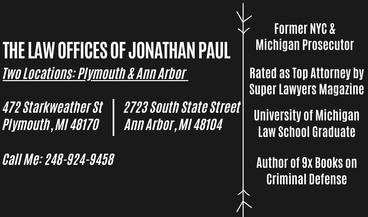Michigan Bond Conditions - DUI AttorneyMichigan DUI - Setting BondI meet new clients charged with drunk driving under two different circumstances. All clients have been arrested and processed by the police, some may have a court date set, some may not; some clients may not even be charged yet due to a delay in receiving the chemical test results (usually blood).
The two different types of clients are either pre-arraignment or post-arraignment. In Michigan, a person charged with a DUI will appear before a judge or magistrate unless an attorney has waived their appearance; some courts allow this, some do not. If my new client has not be arraigned yet, I will actually put some of our own bond conditions in place in anticipation of what a judge may order, which will make us look good when we appear before a judge with items already in place. If my client has been arraigned, we discuss following those conditions, and we usually add additional proactive elements. When a judge in Michigan sets bond in a drunk driving case, the law requires the arraigning magistrate or judge to take into consideration the risk of flight and the potential risk of harm to the public when making a decision to release a person on bond. Most DUI clients do not have a flight risk, but there is a risk of consuming alcohol or drugs while out on bond, and re-offending; this is a worst case scenario for a judge; a person charged with a DUI, getting another DUI while on bond with the court. Conditions of bond requiring the defendant to refrain from the use of drugs or alcohol and monitoring the abstinence of the defendant are routine and will help alleviate the judge’s concern about public safety. The ability to monitor sobriety can justify a personal or nominal bond when risk of flight is not an issue. Most clients arrested for a DUI are issued a personal bond or a reasonable 10 percent provision on a larger amount. Here are some common factors that a magistrate or judge would consider in assessing the appropriate bond: (a) defendant’s prior criminal record, including juvenile offenses; (b) defendant’s record of appearance or nonappearance at court proceedings or flight to avoid prosecution; (c) defendant’s history of substance abuse or addiction; (d) defendant’s mental condition, including character and reputation for dangerousness; (e) the seriousness of the offense charged, the presence or absence of threats, and the probability of conviction and likely sentence; (f) defendant’s employment status and history and financial history insofar as these factors relate to the ability to post money bail; (g) the availability of responsible members of the community who would vouch for or monitor the defendant; (h) facts indicating the defendant’s ties to the community, including family ties and relationships, and length of residence, and (i) any other facts bearing on the risk of nonappearance or danger to the public. In my experience, the number one bond condition for a drunk driving case will be alcohol testing during the case. If alcohol testing has not already been ordered, my clients typically engage in their own proactive alcohol testing to make a good impression on the key players in the case, and to demonstrate sobriety. I will always try to help my client determine the best course of action for testing, which allows them to live a normal life outside of the courthouse. I have many professional clients who would prefer to avoid the inconvenience of the standard court ordered testing. For many of my clients, we're able to setup alternative testing, which better fits their schedule, and still accomplishes the goal of the judge, if not goes beyond what a judge ordered. Currently, the following methods are available to test for the presence of alcohol:
|
Click Here to Email Me
|
|
Representing clients in Ann Arbor, Canton, Brighton, Howell, Saline, Adrian, Taylor, Plymouth, Northville, Westland, Ypsilanti, Pittsfield Township, Warren, Sterling Heights, Farmington, Pontiac, Romulus, Lansing, Novi, South Lyon, Southfield, Birmingham, Bloomfield Hills, Royal Oak, Troy, Rochester, Jackson, East Lansing, Garden City, Livonia, Dearborn, Detroit, St Clair Shores, Hazel Park, Ferndale, Madison Heights, Waterford, Milford, Shelby Township Clarkston, Oak Park, Berkley, Fraser, Sterling Heights, Clinton Township and others throughout Washtenaw, Wayne, Monroe, Jackson, Saginaw, Macomb, Ingham, Lenawee, Charlevoix, Ottawa, Clinton, Eaton, Kent, Crawford, Allegan, Emmet, Barry, Kalkaska, Berrien, St. Clair, Livingston, Oakland County & Northern Michigan
Representing clients faced with DUI/drunk driving, retail fraud/shoplifting, drug charges, MDOP, domestic violence, reckless driving, disorderly conduct, careless driving, leaving the scene of an accident, fake ID, open container, UIP, early termination probation and other misdemeanor and felony charges. |
Ann Arbor Office LocationPlymouth Office Location |

